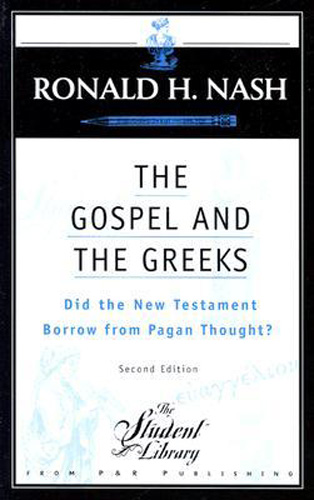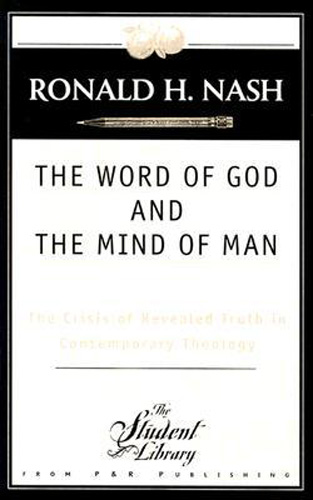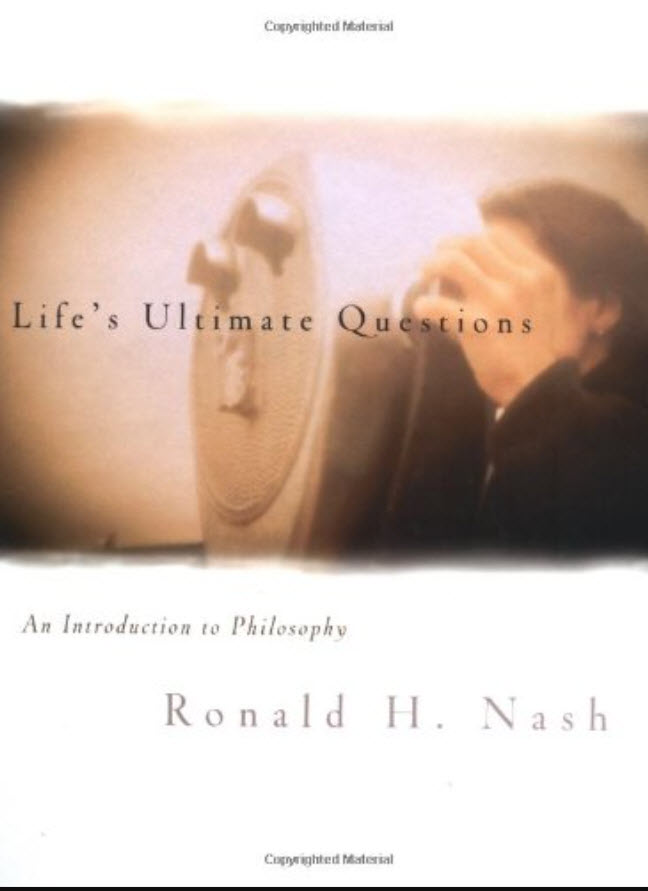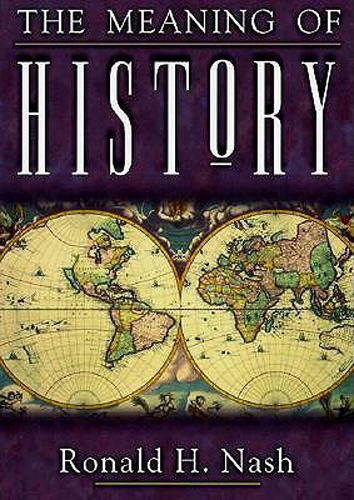History of Philosophy and Christian Thought - Lesson 14
Incarnation
Discussion of Aristotelian philosophy as it relates to the incarnation.

Incarnation
Aristotelian Philosophy
Part 3
VI. The Incarnation
A. God's Essential Properties
1. Omnipotence
2. Omniscience
3. Omnibenevolence
B. Three Distinctions
1. Essential vs. Nonessential Properties
2. Essential vs. Common Properties
3. Fully Human vs. Merely Human
C. Interpretation of Philippians 2
Introduction
0% Complete- 0% Complete
Thales and Anaximander were two philosophers in the sixth century BC that lived in Miletus.
0% Complete - 0% Complete
Heraclitus and Pythagoras lived into the 5th century BC.
0% Complete - 0% Complete
Any worldview addresses the subjects of God, ultimate reality, human knowledge, ethics and human persons.
0% Complete - 0% Complete
Fundamental beliefs of a naturalistic worldview is that nothing exists outside the physical universe and that all things evolved.
0% Complete - 0% Complete
Plato was a student of Socrates and lived into the fourth century BC. He opposed hedonism, empiricism, relativism, materialism, atheism and naturalism.
0% Complete - 0% Complete
Plato described the universe as having three levels: the world of particulars, the world of forms, and the form of the good.
0% Complete - 0% Complete
Plato's view of the universe was dualistic.
0% Complete - 0% Complete
One of Plato's fundamental arguments is that the human soul is immortal.
0% Complete - 0% Complete
Evaluation of Plato's arguments and comparison of Plato's philosophy with biblical theology.
0% Complete - 0% Complete
Empiricism teaches that all human knowledge arises from sense experience. Rationalism teaches that some human knowledge does not arise from sense. experience
0% Complete - 0% Complete
Aristotle was a student of Plato and lived in the fourth century BC.
0% Complete - 0% Complete
Aristotle rejected Plato's doctrine of two worlds.
0% Complete - 0% Complete
Discussion of Aristotelian philosophy as it relates to the incarnation.
0% Complete - 0% Complete
Aristotle's philosophy as it relates to attributes of God and fundamental assumptions about psychology.
0% Complete - 0% Complete
Aristotle made a distinction between passive intellect and active intellect.
0% Complete - 0% Complete
Discussion of the strengths and weaknesses of the law of non-contradiction.
0% Complete - 0% Complete
Discussion of the nature and substance of matter.
0% Complete - 0% Complete
Hellenistic philosophy was an approach that was popular from the fourth century BC to the fifth century AD.
0% Complete - 0% Complete
Stoics were determinists who believed in living according to nature.
0% Complete - 0% Complete
Hedonism emphasized pleasure as the greatest good. "Eat, drink and be merry for tomorrow we might be dead."
0% Complete - 0% Complete
Philo's philosophy was based on a synthesis of Stoicism and Platonism.
0% Complete - 0% Complete
Implicit "Logos" Christianity is an underlying theme in the book of Hebrews.
0% Complete - 0% Complete
Plotinus lived in the third century AD and is considered the founder of Neoplatonism.
0% Complete - 0% Complete
Augustine is a Latin church father, is considered by many to be one of the most important figures in the development of Western Christianity.
0% Complete - 0% Complete
Augustine wrote Confessions as an autobiographical work to record his experience as a sinful youth and his experience becoming a follower of Christ.
0% Complete - 0% Complete
Augustine wrote to refute some heresies of the day by focusing on the concepts of faith and reason.
0% Complete - 0% Complete
Augustine writes about the problem of evil and describes evil as the absence of good.
0% Complete - 0% Complete
Augustine writes to refute Pelagianism by focusing on the biblical teaching about sin.
0% Complete - 0% Complete
Augustine writes to refute Donatism.
0% Complete - 0% Complete
The fundamental idea of skepticism is that no one can know anything. Augustine this statement contradicts itself because the skeptic is claiming that you can know that you can't know anything.
0% Complete - 0% Complete
When Augustine wrote "The City of God," he had a linear view of history.
0% Complete - 0% Complete
In Augustine's theory of knowledge, he says that eternal reason and human reason are two different levels of reason.
0% Complete - 0% Complete
Augustine was personally convinced of the importance of divine illumination.
0% Complete - 0% Complete
The intellectual background of Thomas Aquinas was influenced by the discovery of ancient manuscripts, the rise of universities, the rise of religious brotherhoods and the rise of Muslim philosophy.
0% Complete - 0% Complete
Aquinas describes faith as whatever a human can know through special revelation, and reason as whatever a human can know outside of special revelation.
0% Complete - 0% Complete
Aquinas attempts to prove God's existence.
0% Complete Aquinas describes four kinds of law as eternal, divine, natural and positive.
0% Complete- 0% Complete
The rationalists and empiricists set the stage for Kant and other philosophers of the modern era.
0% Complete - 0% Complete
Kant argued that moral requirements are based on a standard of rationality he dubbed the “Categorical Imperative."
0% Complete - 0% Complete
Kants two worlds are the phenomenal world and the noumenal world.
0% Complete - 0% Complete
Discussion of criticisms and questions about Kant's ideas.
0% Complete - 0% Complete
Similarities between Kant's ideas and postmodernism.
0% Complete - 0% Complete
The dialectic is a central idea in Hegel's philosophy.
0% Complete - 0% Complete
Ideally, Marxism begins with class struggle, then revolution, dictatorship of the proletariat, withering away of the state, and a utopian classless society.
0% Complete - 0% Complete
Discussion of four faces of Marxism.
0% Complete - 0% Complete
Nietzsche proclaimed that, "God is dead." His cure was to live life knowing there is no ultimate meaning. Kierkegaard emphasized a worldview based on true faith.
0% Complete
In this class, you will explore the rich history of philosophy and its relationship with Christian thought. The course begins with an introduction to the definition and importance of philosophy in Christian theology. You will then delve into the evolution of philosophical thought from the Pre-Socratic era, through the Classical Greek philosophers, and into the Hellenistic period. As you progress, you will discover how early Christian thought emerged and developed during the Patristic period, with a special focus on Augustine. The class continues with an examination of medieval Christian thinkers, such as Anselm and Thomas Aquinas, and concludes with an analysis of modern philosophers like Descartes, Kant, and Kierkegaard, and their influence on contemporary Christian thought.
Two other books that are recommended reading for this class are Confessions by Augustine and Phaedo by Plato.
Recommended Books
The Gospel and the Greeks: Did the New Testament Borrow from Pagan Thought?
Examines contemporary claims for Christian dependence on Hellenistic philosophy, Greco-Roman mystery religions, and Gnosticism. He finds the case for dependence in the...

The Word of God and the Mind of Man
The last two centuries of Christian theology are the record of an evolving attack on the role of knowledge in the Christian faith. The purpose of this book is to challenge...

Life's Ultimate Questions: An Introduction to Philosophy
Life's Ultimate Questions is unique among introductory philosophy textbooks. By synthesizing three distinct approaches

The Meaning of History
The Meaning of History is a concise look at the meaning of the history of the world from the viewpoints of major historians and philosophers. By examining the individual...

Dr. Ronald Nash
History of Philosophy and Christian Thought
th620-14
Incarnation
Lesson Transcript
Let's talk about the appendix to chapter four. First of all, I want to relate Aristotle's distinction between essential and nonessential properties. Two to God. God possesses a number of essential properties. God possesses certain essential properties. And these essential properties of God define the essence of God. When you study the doctrine of God, when you study the attributes of God, you are really studying God's essential properties and essential property of God, or an attribute of God is a property that God possesses in every possible world that God exists. If you take the definition of an essential property that we already gave you, that means that if God were to lose even one of His essential properties, if God were to lose even one of his essential properties, he would no longer be God. He would cease to be God. Let me identify some of God's essential properties. Omnipotence. If God lost the property of omnipotence, he would no longer be God. I don't know whether I mentioned this with you, but a couple of weeks ago, I saw a videotape that was interviewing people in some city or other about the massacre of September 11th who was interviewed, and she said, I don't underst I don't know what God's reason is, but I believe that God is in control of this universe. But another lady said, I believe that God wanted to protect us, that God wanted to save us from this horrible disaster, but he couldn't do it. There are a lot of people who think that way, but that won't work. If we have a God who wants to protect us and who couldn't.
[00:02:33] He's not an omnipotent being. Okay. Now, what are some of God's other essential properties? Omniscience. We have a group of people in the evangelical movement who are telling us that poor God doesn't know the future. He's not omniscient with respect to the future. Now, these are not these are not necessarily flaky people teaching in liberal institutions. These are people teaching in evangelical institutions. And for the purposes of the tape, I will not identify the names of these people or the institutions in which they teach. But I can still put their names on the board, can't I? If you deny God's perfect knowledge of the future, you are out of step with the historic Christian position on the omniscience of God. Okay. And likewise omni benevolent God is love. God is just God is holy. All of the attributes of God are essential properties of God. What that means then, is that if God were to lose even one of these essential properties, He would cease being God. All right. Now, having made those points, I now want to go on and discuss the incarnation and show you how the Aristotle's distinction between essential and nonessential properties applies. The doctrine of the incarnation, among other things, teaches us that after the Incarnation, Jesus is fully God and fully human. This strikes many people as a contradiction because people who are so misled are inclined to think that God's essential properties such as holiness, for example, or omniscience, for example, are the opposite of human properties. No human being is omnipotent, no human being is omniscient, no human being is holy. Therefore, God and man are opposites in some way. And therefore, to talk about one person who is fully God and fully human at the same time and in the same sense, strikes some people as a logical contradiction.
[00:05:06] Okay. Now, the purpose of what I'm going to do in the next few minutes is to show you that even though there may be lots of things about the incarnation that we do not understand. And let's just come right out and make that a proposition. All right. Write this in your notes. There are lots of things about the incarnation that we human beings presently do not understand. And give me credit for that sentence. The guy to be a afraid of is the guy who says all the incarnation. That's simple. But what is simple is that even though there's a lot of this material that we don't fully understand, it is not a contradiction. Okay. I wish I could claim credit for the argument that I'm going to give you, but I borrow this argument from a very good book by a very good philosopher. His name is Thomas Morris. So he wrote a book called The Logic of God Incarnate. It's probably in our library. It certainly in the footnotes, the logic of God incarnate. And I think it was published by Cornell University Press. It was published by one of those university presses. He then published a short article based upon the book that is easily accessible. It was published in the Astbury Theological Journal. And I think my footnotes tell you where and probably that article is also in our stacks and our library. I'm sure it is. Now, here is how Tom Morris proved that the teaching of the Incarnation that Jesus Christ is fully God and fully man does not violate Aristotle's law of non contradiction. This stuff is so ingenious. This really is you know, this is an ingenious piece of work that I would strongly suggest that you learn this argument and be prepared perhaps to talk about this argument on the midterm exam.
[00:07:11] Now, what Morris does, his book, of course, is tensely it's intensely argued. It just full of interesting and important points. But I think we can summarize the essence of his position and the essence of his argument in three basic propositions, three basic distinctions. And here they are. The first point that Morris makes is to distinguish between an essential property and a non essential property. Okay, Now, we've already given you that distinction. An essential property of something is a property which, if lost, means that that thing ceases to exist as the kind of thing it was. If a ball loses the property of roundness, it is no longer a ball. If a chair loses its legs, it is no longer a chair. But if a human being. And that's because having legs is an essential property to a chair, but having legs is not an essential property of being a human being. If someone has lost two legs or two arms, a horrible thing to imagine. Of course he is still a human being. Okay, so that's the point to having an essential property and a non-essential property. The second distinction is that between an essential property and a common property. Oh, now you already know what an essential property is. Let me define for you a common property. A common property is a property possessed by every member of a class, every member of a species. But it is not an essential property. A common property is a property. Let's say a common property of a human being is a property that every being a human being possesses. But it is not an essential property. The best example that Morris gives, the best example that anyone can give is the property of having been born on planet Earth.
[00:09:30] That does the trick. As of this moment, every human being possesses who has ever lived possesses the common property of having been born on planet Earth. But can you understand how ten, 20, 30, 100 years in the future, if we're still around, there can be human beings born on spaceships to other other planets. There can be human beings born in colonies around other stars. So having been born on planet Earth is a common property. That is, it's it applies to every human being who has been born thus far. But it is not an essential property. Because if in some on some future occasion, a human being is born off the surface of planet Earth, they will still be a human being. Good example. There are other examples that are less perfect because with respect to other examples, there will always be exceptions, you know? So we have to add the qualification. Typically having. Two arms and two legs is a common human property, typically. But we know that there are there are birth defects and there are other tragedies that happen. And so, you know, 99 and 99% of all human beings, but it's not as good an example as having been born on planet Earth. But we've got the example we need. Now, the relevance of the second distinction is this Whenever human beings begin to focus upon human properties that seem to contradict divine properties, they are focusing not on essential human properties, they are focusing instead on common human properties. Now, this is very tricky. You've got to think with me and you've got to read the appendix to chapter four. If you've already read the appendix to chapter four, this should be a little simpler for you. All right? Human beings do not possess I mean, let's put it this way.
[00:12:02] Human beings possess the property of lacking omniscience. Do you agree that that includes your professor? Okay. Every human being possesses the property of lacking omissions, lacking omnipotence, lacking moral goodness. We're all sinners. So what most people do is they say, look, we're the opposite of God, but you got to understand holiness, omnipotence and so on are essential properties of God. Lacking omniscience, lacking holiness, lacking omnipotence are not essential properties of being a human being. They are common human properties instead. Hence, you eliminate the contradiction. Being a sinner. Let me put it this way. Every human being possesses the common property of being depraved, being a sinner. But that is not essential to being a human being, because for one thing, we had Adam before the fall, okay? And for another thing, we will have totally glorified human beings after the final judgment. So you cannot say that being a sinner is essential to being a human being. Adam was a human being. You and I will be human beings after we've been totally glorified. So the point Morris is making is shallow thinking Christians confuse common human properties with essential human properties, and thus they set up a kind of phony contradiction which doesn't really exist. Okay. Now, the third distinction Tom Morris makes is this It's the difference between being merely human and being fully human. Let me define the second term first. What does it mean to be fully human? It means to possess all of the essential properties that all of the properties that are essential to being a human being. Each. Each one. Every one of us is fully human. Every human being who has ever existed has been fully human. And Jesus Christ was and is fully human. He possesses all of the properties that are essential to being a human being.
[00:14:55] But now there's a difference between. Jesus Christ who is fully human, and us who are merely human. To be merely human is to admit. It's to recognize that you and I will be met. Will never be anything more than human beings. We are fully human. But you and I are merely human. That's it. And if you're shocked at that news, shame on you. All right. Should know that Jesus is fully human, but he is not and never was and never will be merely human. Jesus is fully God and He is fully, fully man, fully human. Now, when you put all of this together, what you come to see is there's no contradiction in Jesus Christ being fully God and fully man. And the only reason there appears to be a contradiction is because most of us ignore, don't know, don't know the differences in points. One and two, everything we're doing here is to set us up so that we can better understand what's going on in Philippians chapter two. Okay, let me quote Philippians tapped. Let me fact let me read the key text from Philippians chapter two. The key passage is this Philippians chapter two. Oh, it's in the first four or five verses of the Chapter five through 11. Thank you. Now, the key passage is this. We're told that when Jesus became a man, he emptied himself and became a man, okay? He emptied himself. That requires us to translate and interpret the phrase emptied himself. Now, I'm going to give you two theories about what that text means to theories. And we're going to call them the right view and the wrong view. Okay. I mean, you know me, I never get pejorative. I always keep an even keel here.
[00:17:17] The wrong view has been given a name. It is called the Kenosis theory, because it's the word kenosis is derived from the original Greek that ends up getting translated in the King James as he emptied himself the Kenosis theory that at the Incarnation, the Eternal Son of God surrendered, gave up, lost some of his essential properties, added new properties, the properties of a human being. Okay, Now let me tell you what's wrong with that theory. If Jesus Christ, if the sick, if the eternal Son of God actually did lose or abandon or surrender, even so much as one essential property of God, what consequence would flow from that? He would no longer be God. If Jesus gave up his omniscience, then He could no longer be God. If He gave up his omnipotence. So you know what? You don't have a contradiction on that. But you do lose something important in the process. You lose the deity of Jesus Christ.